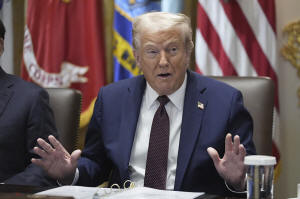Trump saying 600,000 Chinese students could come to the US draws MAGA
backlash
[August 27, 2025]
By ADRIANA GOMEZ LICON and DIDI TANG
WASHINGTON (AP) — President Donald Trump seemingly caught his loyal
conservative base off-guard and sparked backlash by saying he would
allow 600,000 Chinese students into American universities.
That would be a departure for the Trump administration after it added
new vetting for student visas, moved to block foreign enrollment at
Harvard and expanded the grounds for terminating international students’
ability to study in the United States.
Secretary of State Marco Rubio has singled out China, the second highest
source of international students in the U.S., saying in May that the
State Department would revoke visas for students tied to the Chinese
Communist Party and boost vetting of new applicants.
Trump's announcement Monday adds to the confusion about the
administration's restrictive visa policies and its approach to China as
the superpowers tussle over trade and intensifying tech competition. It
also marks another divide with figures in Trump's “Make America Great
Again” base, who tout an “America First” agenda and had contested the
U.S. inserting itself in the recent Israel-Iran war.
Some of Trump's most ardent supporters — from U.S. Rep. Marjorie Taylor
Greene to former adviser Steve Bannon and far-right activist Laura
Loomer — rejected the idea of welcoming more Chinese students.
It’s not immediately clear why the figure Trump cited was so high — more
than twice the number of Chinese students enrolled in the 2023-2024
school year. The total also has been falling in the past few years. The
White House and State Department did not immediately respond to requests
for comment.
Here's what to know about Trump's announcement and the reaction:

What did Trump say about Chinese students?
During a meeting with South Korean President Lee Jae Myung in the Oval
Office on Monday, Trump was asked by reporters if he would meet with
Chinese President Xi Jinping.
“President Xi would like me to come to China. It’s a very important
relationship. As you know, we are taking a lot of money in from China
because of the tariffs and different things,” he said. “I hear so many
stories about ‘We are not going to allow their students,’ but we are
going to allow their students to come in. We are going to allow it. It’s
very important — 600,000 students.”
Trump doubled down at a Cabinet meeting Tuesday, sitting next to Rubio,
where he said he was “honored” to have Chinese students in the U.S. and
said they help colleges stay afloat.
“I told this to President Xi that we’re honored to have their students
here," Trump said. “Now, with that, we check and we’re careful, we see
who is there.”
The Chinese Foreign Ministry also said that Trump told Xi in a June
phone call that “the U.S. loves to have Chinese students coming to study
in America.”
It was a shift after the State Department announced in late May that it
would “aggressively revoke visas for Chinese students, including those
with connections with the Chinese Communist Party or studying in
critical fields."
How many Chinese students come to the US?
After decades of growth, the number of Chinese students in the U.S.
peaked at 372,532 in the 2019-2020 academic year, just as the COVID-19
pandemic took hold. The number slipped to 289,526 in 2022 and further
dipped to 277,398 in 2023.

In the past year, several U.S. universities, including the University of
Michigan, have ended their joint partnerships with Chinese universities
after Republicans raised concerns that U.S. dollars have contributed to
China’s tech advancement and military modernization.
Experts say the number of students is likely to fall further because of
tense U.S.-China relations and China’s declining population.
There’s growing bipartisan consensus that U.S. schools should not help
train Beijing's top talent in critical fields such as quantum computing,
artificial intelligence and aerospace technology.
[to top of second column]
|

President Donald Trump speaks during a cabinet meeting, Tuesday,
Aug. 26, 2025, at the White House in Washington. (AP Photo/Mark
Schiefelbein)

Kurt Campbell, deputy secretary of state in the Biden
administration, has said he would like to see Chinese students
coming to the U.S. to study humanities and social sciences, “not
particle physics.”
During his first term, Trump banned Chinese graduate students who
had attended schools with Chinese military ties.
How are Trump's supporters reacting?
Bannon, one of Trump's former advisers, criticized the announcement
Tuesday, saying “there should be no foreign students here for the
moment."
Commerce Secretary Howard Lutnick was asked Monday on Fox News’ “The
Ingraham Angle” how such a shift would be consistent with Trump’s
“America First” push. Lutnick argued that Trump was taking a
“rational economic view” and asserted that 15% of American
universities and colleges would go out of business without those
foreign students.
“I just don’t understand it for the life of me. Those are 600,000
spots that American kids won’t get,” host Laura Ingraham said.
At Tuesday's Cabinet meeting, Trump said international students are
helping keep some U.S. schools afloat.
“And you know what would happen if they didn’t (come)? Our college
system would go to hell very quickly and it wouldn’t be the top
colleges. It would be colleges that struggle on the bottom,” Trump
said.
An analysis by NAFSA, an association of international educators,
found that international students studying at U.S. colleges and
universities contributed $43.8 billion to the U.S. economy and
supported 378,175 jobs during the 2023-2024 academic year.
Greene, the Republican congresswoman from Georgia, raised questions.
“If refusing to allow these Chinese students to attend our schools
causes 15% of them to fail then these schools should fail anyways
because they are being propped up by the CCP,” Greene said,
referring to the Chinese Communist Party.

What is China saying about student visa restrictions?
The Chinese Embassy in Washington did not immediately respond to
messages seeking comment. The foreign ministry has called out the
U.S. for what it says is “discriminatory, politically driven and
selective law enforcement” against Chinese students arriving in the
U.S.
Mao Ning, a ministry spokesperson, said Friday that students have
been treated unfairly and subjected to extended interrogations. Mao
said some students had their visas revoked and were banned from
entering the country after they were told they “might endanger
national security.”
“The U.S.’s moves severely violate the legitimate and lawful rights
and interests of Chinese nationals, impede the flow of people
between the two countries and dampen China-U.S. people-to-people
exchanges,” she said.
The embassy issued an advisory Monday urging Chinese students not to
enter the U.S. through Houston’s George Bush Intercontinental
Airport, alleging several students were harassed and interrogated by
customs officials. The embassy said at least one student was
detained for more than 80 hours before being sent back to China.
___
This story has been corrected to fix the spelling of the commerce
secretary’s last name to Lutnick, instead of Lutnik.
All contents © copyright 2025 Associated Press. All rights reserved
 |